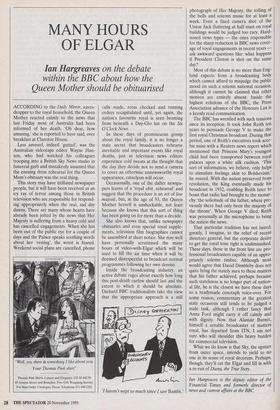MANY HOURS OF ELGAR
Ian Hargreaves on the debate within the BBC about how the
Queen Mother should be obituarised
ACCORDING to the Daily Mirror, eaves- dropper to the royal household, the Queen Mother reacted calmly to the news that last Friday most of Australia had been informed of her death. 'Oh dear, how amusing,' she is reported to have said, over breakfast at Clarence House.
Less amused, indeed 'gutted', was the Australian videotape editor Wayne Han- son, who had watched his colleagues trooping into a British Sky News studio in funereal garb and mistakenly assumed that the ensuing dress rehearsal for the Queen Mum's obituary was the real thing.
This story may have titillated newspaper people, but it will have been received as an icy ray of terror among those in British television who are responsible for respond- ing appropriately when the real, sad day dawns. There are many whose hearts have already been jolted by the news that Her Majesty is suffering from a heavy cold and has cancelled engagements. When she has been out of the public eye for a couple of days and the Palace speaks soothing words about her 'resting', the worst is feared. Weekend social plans are cancelled, phone
"Well, yes, there is something I like about you. Your Thomas Pink shirt."
Thomas Pink Shirts. Luxury and Elegance, £32.50442.50 85 Jermyn Street and Branches. Free Gift Wrapping Service. For Mail Order Catalogue, Please Telephone 071-498 2202
calls made, rotas checked and running orders recapitulated until, yet again, the nation's favourite royal is seen beaming from beneath a Day-Glo hat on the Six O'Clock News.
In these days of promiscuous gossip about the royal family, it is no longer a state secret that broadcasters rehearse inevitable and important events like royal deaths, just as television news editors experience cold sweats at the thought that the day they decide not to send a camera to cover an otherwise unnewsworthy royal appearance, cataclysm will occur.
Occasionally, one of the dafter newspa- pers learns of a `royal obit. rehearsal' and suggest that the procedure is an act of lese majeste, but, at the age of 93, the Queen Mother herself is unshockable, not least because she knows that this sort of thing has been going on for more than a decade.
She also knows that, unlike newspaper obituaries and even special royal supple- ments, television film biographies cannot be assembled at short notice. She may well have personally scrutinised the many hours of video-with-Elgar which will he used to fill the air time when it will be deemed disrespectful to broadcast normal programmes following her own demise.
Inside the broadcasting industry, an active debate rages about exactly how long this post-death curfew should last and the extent to which it should be absolute. Diehard BBC traditionalists take the view that the appropriate approach is a still
'I haven't wept so much since I saw Bambi.'
photograph of Her Majesty, the tolling of the bells and solemn music for at least a week. Even a fixed camera shot of the Union Jack fluttering at half mast on royal buildings would be judged too racy. Hard- nosed news types — the ones responsible for the sharp reduction in BBC news cover- age of royal engagements in recent years ask awkward questions like: what happens if President Clinton is shot on the same day?
Most of this debate is no more than Eng- land expects from a broadcasting body which cannot afford to misjudge the public mood on such a solemn national occasion, although it cannot be claimed that other motives are entirely absent. Inside the highest echelons of the BBC, the Press Association advance of the Honours List is a keenly read communication.
The BBC has wrestled with such tensions since its inception. It took John Reith ten years to persuade George V to make the first royal Christmas broadcast. During that period, one of Reith's executives took acer- bic issue with a Reuters news report which mentioned that Princess Mary's youngest child had been transported between royal palaces upon a white silk cushion. 'This sort of information, we believe, only helps to stimulate feelings akin to Bolshevism,' he roared. With the nation preserved from revolution, the King eventually made his broadcast in 1932, enabling Reith later to boast that radio had brought to the monar- chy `the solicitude of the father, where pre- viously there had only been the majesty of the throne'. When George V died, Reith was personally at the microphone to bring the nation the news.
That particular tradition has not lasted, greatly, I imagine, to the relief of recent directors general, but the corporate desire to get the royal tone right is undiminished. These days, those in the front line are pro- fessional broadcasters capable of an appro- priately solemn timbre. Although most would agree that David Dimbleby does not quite bring the stately aura to these matters that his father achieved, perhaps because such stateliness is no longer part of nation- al life, he is the closest we have these days to a readymade cenotaph voice-over. For some reason, commentary at the greatest state occasions still tends to be judged a male task, although I rather fancy that Anna Ford might carry it off calmly and with dignity. Now that Alastair Burnet, himself a notable broadcaster of matters royal, has departed from ITN, I am not sure who will shoulder this heavy burden for commercial television.
What we do know is that Sky, the upstart from outer space, intends to yield to no one in its sense of royal decorum. Perhaps, though, they'll cut the Elgar and fill in with a re-run of Diana, the True Story.
Ian Hargreaves is the deputy editor of the Financial Times and formerly director of news and current affairs at the BBC.










































































 Previous page
Previous page